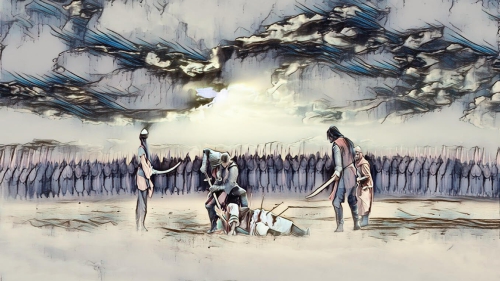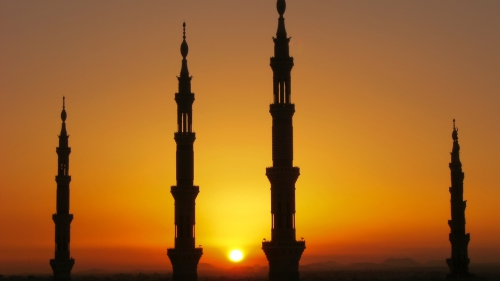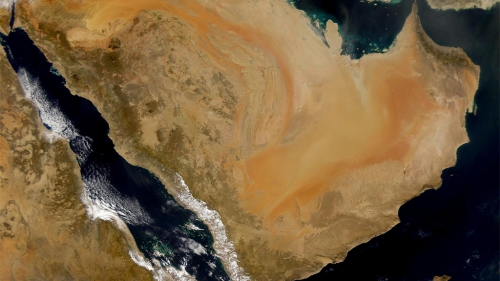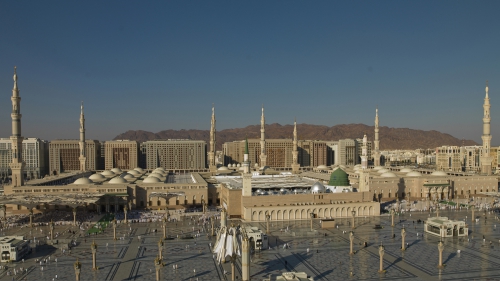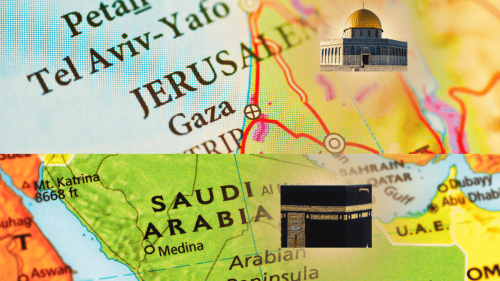The Battle of Uhud as a Purifier

Summary: The battle of Uhud was a remarkable event in the history of Islam and Islamic civilization. In many ways, it marked a turning point especially in matters pertaining to human-resource development and the development of spirit as well as consciousness.
The Islamic city-state of Madinah was in its infancy, hence a comprehensive blueprint and action plan, insofar as the impending task of the civilization-building processes was concerned, were needed. The miraculous battle of Badr - about one year before the Uhud tragedy - played its big role; however, if properly examined, the Uhud episode, too, was a godsend. It was a window of opportunity no less than Badr itself, in that - as per the worldview and belief system of Muslims - the believers are motivated as much by calamities as fortunes.
The Uhud battle acts as an inexhaustible source of wisdom with respect to success and failure that come to all at varying times. Win or lose, Muslims must be principled and must win respect. Winning should be with humility and losing with dignity. Both are to be grounded in faith and accountability, for they are nothing but part of Allah’s majestic plan for His creation. Only then will winning be converted into a true accomplishment and losing into an opportunity. In the long run, even the latter can turn out to be a victory.
Indeed, such is the nature of virtue that under all circumstances it is bound to weather the storm and contrive its own triumphs. Whereas evil, owing to a character peculiar to itself, whenever it is “given rope a little, it works out its own destruction.” Come what may, evil never stops filling up its cup of iniquity, and no sooner does the process come to an end, than the culprits are brought to book. Ultimately – it follows – the Uhud debacle proved more beneficial to the “vanquished” Muslims than to the “victorious” Makkan polytheists.
This article discusses an important lesson of Uhud, namely the role of the battle and the events associated with it as a purifier. Uhud purified not only individuals, but also communities, yet the entire Madinah society, from the increasing both corporeal and incorporeal inhibitions, which threatened to hold back the Muslim civilizational progress. The focus of the article concerns the cases of the hypocrites, the Jews and the self-righteous Muslims. The article is a sequel to an earlier piece titled “Badr was a miraculous gift, Uhud a reality check” which can be viewed here: https://www.islamicity.org/82486/badr-was-a-miraculous-gift-uhud-a-reality-check/
Another profound lesson that can be extracted from the battle of Uhud is that the occasion served as a purifier. It purified not only individuals, but also Madinah as a whole in its capacity as a rising urban marvel and a nascent civilizational archetype.
The Madinah polity was merely three years old and as the human and community development processes were gathering steam, more and more impediments kept emerging, standing in the way. Those impediments were in the form of ideas and personnel, and were of individual and collective dispositions. For example, the community of hypocrites and their myriad types and manifestations of hypocrisy in thought, speech and deeds, and the inauspicious and every so often out-and-out detrimental roles of the Jewish communities, never slept. They went all out to find and capitalize on any openings with the aim of slowing down the progress. The targets were sceptical and weak individuals, as well as discordant groups in which the former might have occupied critical ranks and have assumed important functions.
The failure of coming to terms with the Badr miracle
As a heavenly gift and handsome reward, the Badr battle was also an eye-opener, but in a different sense of the word. Its edifying aspects were for particular purposes and particular groups of people. Not everybody was worthy of the Badr miracle. Thus, the teachings of Badr were not able to enlighten the minds of certain people, and its morals were not able to reach their hearts. For that reason, some Muslims became complacent, believing that the example of Badr was their entitlement and what the future was holding in store was nothing but a sweet series of Badrs. Non-Muslims, on the other hand – be they hard-core hypocrites, Jews, or polytheists – by virtue of being what they were, could not come to terms with the notion and implications of divine miracles, owing to which, to them, Badr did not reveal anything significant, nor conclusive, concerning the case of Muslims and their rolling enterprise.
The judgments of non-Muslims in relation to Badr and its aftermath were erroneous. Refusing to believe in miracles and having yet to see how resilient in defeat Muslims were - essentially invincible over the long term – non-Muslims were afforded an incomplete picture of the nature of challenges they were up against. It is no surprise then that most of their conclusions and behavioural models were wide of the mark.
That both Muslim and non-Muslim parties were wrong was expected, for Badr was beyond them and their aptitudes. Most of the complacent Muslims, by and large, were not Badr participants, so their assessments were hypothetical, rather than experiential. Mainly from this group were those Muslims who convinced the Prophet – despite the latter’s reluctance - to change his original fighting strategy from meeting the enemy inside the city of Madinah proper to exiting Madinah and squaring off with the enemy in the open. From the same group - in addition to a number of other unscrupulous Muslims – were the archers who had been strategically positioned on a nearby hill but who violated the Prophet’s instructions and caused a domino effect through the battlefield with disastrous consequences, and were likewise those soldiers whose greed and cowardice were instrumental in the Uhud defeat.
In like manner, instead of setting the record straight at the heels of the Badr triumph, and instead of improving their conduct in general and vis-à-vis the Prophet and Muslims in particular – as many formerly sceptical individuals had actually done, even accepting Islam – the majority of hypocrites and Jews in Madinah did not budge. Yet, in their avowed non-belief, they moved their unholy ways to a whole new level. They started walking their talk.
Take for example the hypocrites. In addition to perennially spreading lies and confusion – like what they had done during the battle of Badr, saying for instance: “These people (Muslims) are deceived by their religion” (al-Anfal, 49) - during the battle of Uhud they bucked up their words of pretence. They yet initially joined the Muslim military ranks that numbered about a thousand men. However, on the way to the venue of the battle at the foot of the Uhud Mountain, the party of hypocrites led by their leader Abdullah Ibn Ubayy – about a third of the Muslim army – betrayed the Prophet and returned to Madinah, leaving the Muslims in the lurch. The sudden development sent shock waves through the Muslim lines, so much so that some others started to contemplate doing the same, as the Qur’an discloses: “When two parties among you were about to lose courage, but Allah was their ally; and upon Allah the believers should rely” (Alu ‘Imran, 122).
The Jews, likewise, showed that the Badr impact was of no avail to them. It yet encouraged them to carry on their treacherous designs, in that the success of Badr, which they neither could, nor wanted to, swallow, increased them only in jealousy and indignation. It was only after Badr that they started a series of provocative and harmful deeds publicly. They were turning into an ever domineering nemesis. The Prophet admonished and called them to be rational, sensible and guided, and cautioned against transgressions. Nevertheless, the Jews remained obdurate and paid no heed to the Prophet’s warning, and said, alluding to their misapprehension of the Badr miracle and of what was going on in Madinah at large: “Do not be deluded on account of defeating some Qurayshites inexperienced in the art of war. If you were to engage us in a fight, you will realize that we are genuine war experts” (Mubarakpuri, The Sealed Nectar).
With all those people around, challenges to the Madinah project were immense. Obviously, there were a great many protagonists and forces that worked for the benefit of the mission, but also there were such that functioned otherwise. The Prophet had to walk a tightrope to maintain an increasingly untenable balance. Putting into practice a lot of issues was a frustrating business, almost a case of one step forward, two steps back.
To set the stage for a comprehensive civilizational blueprint, and to bring forth a number of civilizational breakthroughs in Madinah, was an extremely demanding task. Every single member’s constructive participation and role were looked forward to. People had to be on the same wavelength and had to move towards the same direction. Discords, incongruities and quarrels were by no means milieus conducive to civilization breeding.
Madinah and a need for purification
In the third year of its presence, it was high time for the Madinah phenomenon to be shaken up and be purified of its sterile components. After everybody had been given enough time and enough opportunities, the dead wood needed to be attended to, and if necessary, disposed of. Sundry practical aspects of the gallant notions of unity, integration and solidarity were begging for attention.
The battle of Uhud was of the first steps intended for the purpose. It was a concomitant of a bigger activity which is the purification of Madinah in toto. The Prophet said that Madinah as Tayyibah and Tabah (meaning “good”, “wholesome”, “virtuous”, “pure” and “chaste”) “expels filth from it just like the fire expels filth from iron.” Madinah and all sorts of impurities are incompatible. The Qur’an is explicit that the ill-fated event of Uhud was a test meant to purify the believers, and – eventually – do away with those who resisted the truth, exchanging it for the alternatives of falsehood: “And that Allah may purify the believers (through trials, such as those associated with Uhud) and destroy the disbelievers. Or do you think that you will enter paradise while Allah has not yet made evident those of you who fight in His cause and made evident those who are steadfast?” (Alu ‘Imran, 141-142).
The purification process of Uhud was universal, encompassing each and every dimension of the believers’ being: “(The proceedings of Uhud happened) so that Allah might test what is in your breasts and purify what is in your hearts. And Allah is knowing of that within the breasts” (Alu ‘Imran, 153).
Moreover, the Qur’an says that Allah would not leave the believers in the state they were in (with reference to the Uhud trials) until “He distinguishes and separates the evil from the good” (Alu ‘Imran, 179). Ibn Kathir commented on this verse, implying the intensity and scope of the purification and separation measures at Uhud: “(Allah) allows a calamity to happen, and during this calamity His friend becomes known and His enemy exposed, the patient believer recognized and the sinful hypocrite revealed. This ayah (verse) refers to Uhud, since Allah tested the believers in that battle, thus making known the faith, endurance, patience, firmness and obedience to Allah and His Messenger that the believers had. Allah exposed the hypocrites in their defiance, reverting from jihad, and the treachery they committed against Allah and His Messenger.”
Al-Maududi furthermore in his exegesis of the Qur’an “Tafhim al-Qur’an” remarked that Allah does not like to see the believers perpetually remaining mixed up with the hypocrites in one and the same Muslim community. The purification and separation undertakings become a necessity sooner rather than later. However, such cannot be done only in theory, by revealing the truth about each group, but also in practice, so that a clear demarcation line between the two realms is clearly drawn. Al-Maududi said: “Allah does not separate the believers from the hypocrites by informing the Muslims that, in their heart of hearts, such and such are hypocrites. He distinguishes true believers from hypocrites by creating such occasions as practically separate the two groups from each other.”
The case of the Madinah hypocrites
To be sure, the case of the hypocrites was exposed in connection with the battle of Uhud as never before. The Qur’an says that what had befallen Muslims on the day of Uhud when the two armies had met was by permission of Allah, so as to establish beyond any doubt who was who in the hierarchy of Madinah operators. As one would expect, the first group were the believers concerning whom Allah tells that they were tested in order to be known and their case made evident to everybody (Alu ‘Imran, 166). However, as soon as this idea was presented – albeit briefly, for the case of believers was as much straightforward as self-evident – the Qur’an proceeded to expose the case of the hypocrites also with the intention of making them and their peril known.
Some of the hypocrites’ lame excuses and shallow modi operandi have been uncovered. They were told on the eve of the Uhud battle: ‘“Come, fight in the way of Allah or (at least) defend.’ They said: ‘If we had known (there would be) fighting, we would have followed you’” (Alu ‘Imran, 167). However, as Ibn Kathir commented in the interpretation of the verse to the effect that such a pretext of the hypocrites was absurd and foolish, since they – just like the entire population of Madinah – knew full well “that there was an army of idolaters that came from a far land raging against the Muslims, to avenge their noble men whom the Muslims killed in Badr. These idolaters came in larger numbers than the Muslims, so it was clear that a battle will certainly occur.”
No sooner had the above revelation pertaining to the hypocrites been made, than Allah passed two unequivocal decrees: first, that the hypocrites at the time of the Uhud confrontation were closer to disbelief than to faith; and second, that the hypocrites were saying with their mouths what was not in their hearts, and that Allah was most knowing of what they used to conceal – and hence, was committed to taking charge of the matter (Alu ‘Imran, 167).
The Qur’an continues in the sense that the hypocrites were the ones who harangued about their killed brethren at Uhud while they themselves had run away and sat at home: “If they had obeyed us, they would not have been killed” (Alu ‘Imran, 168). The last verse was revealed particularly in connection with the actions of Abdullah Ibn Ubayy, the chief of the Madinah hypocrites. The Qur’an retorted to this drivel of the hypocrites and their chief, challenging them: “Then prevent death from yourselves, if you should be truthful (Alu ‘Imran, 168).
All in all, following the experiences of Uhud and the accompanying revelations of the Qur’an, the instance of the Madinah hypocrites went on a downward path and never recovered afterwards. When the Qur’anic chapter al-Munafiqun (“the Hypocrites”) was revealed in the 6th year following the hijrah, the case of the Madinah hypocrites was on the wane and was becoming rather “unfashionable.” The chapter in the most definite manner exposes, as well as rebukes, the treachery of the hypocrites and warns the Prophet against trusting, yet having anything to do with them, for “they are the enemy, so beware of them. May Allah destroy them; how are they deluded?” (al-Munafiqun, 4). Their fate was sealed for good by Allah’s words: “And when it is said to them: ‘Come, the Messenger of Allah will ask forgiveness for you,’ they turn their heads aside and you see them evading while they are arrogant. It is all the same for them whether you ask forgiveness for them or do not ask forgiveness for them; never will Allah forgive them. Indeed, Allah does not guide the defiantly disobedient people” (al-Munafiqun, 5-6).
The case of the Madinah Jews
The Qur’an also referred to the brewing misconduct of the Madinah Jews, which was exacerbated after the victory of Badr and was diversified subsequent to the debacle of Uhud. The former amplified the resentment and snobbery of the Jews, while the latter strengthened their propensity to sow pessimism and doubt. In more ways than one, Uhud upped the ante. Certainly, the words and deeds of the Jews carried weight because they were of the “People of the Book” and “knew” what they were doing. Their exploits were eagerly watched for on the part of the rest of the Madinah felons.
As far as the Uhud affair was concerned, the Jews were of those who spawned much abuse and wrong, which grieved Muslims to a great extent. They articulated lies linking the disaster of Uhud with the alleged faults of the Prophet’s personality and his purported prophetic mission. As if they were saying that Uhud was the beginning of the Prophet’s and Islam’s end, and that such was the situation because the untruths of the Prophet’s claims could only lead to disastrous ends. They wanted very much to be honoured and be part of the process. In consequence, the Qur’an in a single verse conjoins the subject of trials in possessions and lives - such as the one at Uhud - with the tendency of causing abuse and propagating wrong by those “who were given the Scripture before you, and by the idolaters” (Alu ‘Imran, 186).
Following the same spirit, in the succeeding verse the Qur’an reminds the Jews that they were supposed to know who the Prophet and what his calling actually were – and accordingly, what the trials of Uhud signified in the grand ontological scheme of things. That knowledge was expected to be there in the light of the Jewish ancient covenant with Allah, which nevertheless they and their forefathers had betrayed. As per the stipulations of the covenant, the Jews were asked to expound and make the covenant clear to people and not to manipulate or hide any aspect thereof. However, they gradually ended up cheating, throwing the covenant away behind their backs and purchasing with it some miserable gain (Alu ‘Imran, 187). As a result, the Jews rejected the Prophet and Islam - but had they remained faithful to the covenant, they would not have done thus. They then looked out for any opportunity to try to undermine the integrity of the Prophet and to stop the kinetic energy of the Islamic movement, and the battle of Uhud proved not just any opportunity, but a lucky break that could not go unexploited.
There were three considerably large Jewish tribes in Madinah: Banu Qaynuqa’, Banu al-Nadhir and Banu Qurayzah. After the battle of Badr, their world started unravelling. As a result, shortly after Badr, but before the Uhud episode, the Banu Qaynuqa’ tribe was expelled owing to its increasing and unbearable offenses. However, once the Uhud disaster was over, the Jews were caught in a dilemma. Their behaviour fluctuated between resignation and slackness, on the one hand, and rebellion coupled with treacherous clandestine contacts with the Makkans and the local hypocrites in order to establish an alliance against the Muslims, on the other. “Being inexperienced in war tactics, they resorted to conspiracy and intrigue hatching. They first of all declared open hatred and enmity, and chose to play all sorts of tricks that might harm the Muslims, but were very careful not to initiate any sort of hostilities that might involve them in open war” (Mubarakpuri, The Sealed Nectar). The latest developments led to the expulsion of the Banu al-Nadhir tribe, which, encouraged by the Uhud defeat of Muslims, openly challenged the Prophet and even attempted to assassinate him. The expulsion took place shortly after the Uhud events. The last Banu Qurayzah tribe was virtually eliminated about two years after Uhud because during the battle of Khandaq or the Trench, the tribe defiantly turned against the treaties with the Prophet and sided with the invading polytheistic armies. The violation was an act of treason, posing an existential threat. Thus the battle of Uhud contributed, somehow or other, to the ultimate end both of the hypocrites and the Jewish community of Madinah.
The case of the self-righteous and complacent Muslims
In respect to the Muslims, the Uhud circumstance was a purifying agent too. People’s weaknesses and strengths were clearly exposed, as were avenues for rectifying the former and further enhancing the latter. The leadership genius and tactical brilliance of the Prophet, coupled with the infallibility of everything he said and did, were emphasized yet again, drawing attention to the ever-present miraculous dimension of his life. People were assured time and again that, no matter what, they had their Prophet to trust and fall back on. He was always there for them, oozing confidence and radiating positive energy. He was a perfect and universal being. He was a saviour.
The following two Qur’anic verses, revealed in conjunction with Uhud, epitomize this doctrine: “So by mercy from Allah, (O Muhammad), you were lenient with them. And if you had been rude (in speech) and harsh in heart, they would have disbanded from about you. So pardon them and ask forgiveness for them and consult them in the matter. And when you have decided, then rely upon Allah. Indeed, Allah loves those who rely (upon Him)” (Alu ‘Imran, 159); “And it is not attributable to a prophet that he should act unfaithfully; and he who acts unfaithfully shall bring that in respect of which he has acted unfaithfully on the day of resurrection” (Alu ‘Imran, 161).
Uhud was a blessing, much the same as Badr. It in fact rounded off the former, generating a full overview. Uhud, therefore, was more than a lesson or a set of lessons; it was a school whose impetus was etched in memory and history books forever. If apropos of Badr Muslims were taught how to celebrate and live with victory, apropos of Uhud they were taught how to cope with defeat, yet how to take it in their stride. Win or lose, Muslims must be principled and must win respect. Winning should be with humility and losing with dignity. Both are to be grounded in faith and accountability. Only then will winning be converted into a true accomplishment and losing into an opportunity. In the long run, even the latter can turn out to be a victory, an invaluable life lesson and enriching experience learned the hard way.
Having been reminded of their misdeeds during the tragedy of Uhud, the culprits from among the Muslims were guided to the paths of improvement: patience, piety, God-consciousness, humility, steadfastness and enthusiasm. The Qur’an sums up these qualities in the virtue of constantly obeying Allah and His Messenger, so that people may be shown mercy, whose ramifications are infinite not only for physical, but also for the rest of existential battles (Alu ‘Imran, 132). In short, Muslims were informed that there are no shortcuts to excellence, that fortune favours the triad of valour, prudence and virtue, and that victories are achieved on multiple fields, the combat zone being only one of them. Indeed, the roads to victories – successes in both worlds - are paved with the abundance of advantages and proficiencies, fusing the corporeal, moral and spiritual segments, given that martial combats are small-scale versions of life struggles. Conversely, Muslims are asked not to obey the unbelievers – in matters that may jeopardize their obedience to Allah and the Prophet. If they did, the unbelievers “will turn you back on your heels, and you will (then) become losers” (Alu ‘Imran, 149).
The Qur’an also reminds the believers that many prophets before Prophet Muhammad (peace and blessings be upon him and his family) had fought. That was so because fighting is a rule of life; it is a “normal” and “human” affair, so Islam only regulates it. Those prophets were victorious; however, as a secret weapon the Qur’an does not highlight their military strengths, neither in relation to the size of their armies nor the types and extent of their military equipment. Rather, it is stressed that those prophets had fought with a number of devoted and godly men, sometimes yet understood as droves of religious scholars. Their trademark was that they “never lost heart if they met with disaster in Allah's way, nor did they weaken (in will) nor give in. And their words were not but that they said: ‘Our Lord, forgive us our sins and the excess (committed) in our affairs and plant firmly our feet and give us victory over the disbelieving people’” (Alu ‘Imran, 146-147).
This mixture of the worldly (material) and otherworldly (spiritual) preparedness was the formula for their success: “So Allah gave them the reward of this world and the good reward of the Hereafter. And Allah loves the doers of good” (Alu ‘Imran, 148). Surely, it is no coincidence that the above discourse is concluded by the words “Allah loves the doers of good”, which, as a matter of fact, complement the morals of the earlier verses wherein it is made clear that “Allah loves the steadfast and patient ones” (Alu ‘Imran, 146), that Allah “will reward the grateful” (Alu ‘Imran, 144, 145), that “Allah does not like the wrongdoers” (Alu ‘Imran, 140), and that Allah wishes to make “evident those of you who fight in His cause and (make evident) those who are steadfast” (Alu ‘Imran, 142).
By the same token, and in order to achieve similar objectives, the Qur’an directs Muslims to “travel through the earth, and see what the end of those who rejected the truth had been” (Alu ‘Imran, 137). This was to further augment the lessons of both Badr and Uhud. Muslims are supposed to learn not only from their own experiences and mistakes, but as well from the experiences and mistakes of others, as a proverb goes to the effect that a wise person learns from the faults of others and a fool from his own. History is replete with people’s triumphs (Badrs) and failures (Uhuds), celebrating the former and reproaching the latter. That makes history at once a hall of fame of victors and a burial place of losers. History is a great teacher giving a grounding in how to live and whose life models to follow, and, in equal measure, how not to live and whose life patterns not to follow. Life is too short to be wasted on learning and attaining wisdom by trial and error.
The Qur’an portrays history as a repository of sunan (individual and collective - civilizational - examples, systems and ways of life). There is a profound wisdom running through the veins of history, making the latter a means, in lieu of an end in itself. There is moreover an invisible hand in the making and breaking of history, which is a metaphor for the unseen force that moves and shapes history. Come what may, Allah loves and wishes well to the believers, and despises and wishes destruction to the obstinate unbelievers. History is an arena for the working of Allah’s infinite and mysterious ways, whereby both goodness and evil and their respective central characters are bound to come to the fore. Things are beyond what a person can imagine, let alone comprehend, wherefore the believers need to have trust in Allah and do the best they can. Taking care of what the believers can – i.e. what is in themselves – prompts Allah to take care of what they cannot and what is outside and beyond themselves. For that reason did the Qur’an in the context of the Uhud narrative command the Prophet: “And when you have decided, then rely upon Allah. Indeed, Allah loves those who rely (upon Him)” (Alu ‘Imran, 159).
The Qur’an declares about this Uhud-related tenet: “Such days (of varying fortunes) We give to men and men by turns, that Allah may know those that believe, and that He may take to Himself from your ranks martyr-witnesses (to the truth)” (Alu ‘Imran, 140). Abdullah Yusuf Ali elaborated concerning the wisdom of this verse: “Success or failure in this world comes to all at varying times: we must not grumble, as we do not see the whole of Allah's Plan. Men's true mettle is known in adversity as gold is assayed in fire. Martyrdom is in itself an honour and a privilege: how glorious is the fame of Hamza the Martyr (the Prince of the Uhud martyrs)? If there is any dross in us, it will be purified by resistance and struggle.”
In truth, so profoundly consequential was the Uhud battle that, apart from comprising more than just a silver lining for the believers, it also in a roundabout way spelled doom for the unbelievers. “When evil is given rope a little, it works out its own destruction; the orgies of cruelty indulged in by the Pagans after what they supposed to be their victory at Uhud filled up their cup of iniquity; it lost them the support and adherence of the best in their own ranks, and hastened the destruction of Paganism from Arabia” (Abdullah Yusuf Ali, Qur’an English Translation and Commentary).
The importance of the Islamic worldview
At long last, it was necessary that the Uhud spectacle with all its exceptional dimensions be anchored in a range of novel features of the Islamic worldview. Tre truth is that most of the Islamic worldview, as an integral part of the belief system of Islam and its overall religious framework, had been established prior to the occasion of Uhud, especially during the Makkan period of revelation, however, the special Uhud experiences called for special heavenly interventions. Uhud with its copious direct and indirect corollaries needed to be comprehended properly and also be put into perspective. It needed perhaps the trickiest and most intricate aspects of the Islamic worldview, which concurrently stood for the culmination of the process of revealing such a world outlook (weltanschauung) and for the pinnacle of its structural edifice. That was the case for the reason that the future of Islam and Muslims depended on the matter, and lest more Uhuds should come to pass. Undeniably, a lot of people erred during the misfortune of Uhud on account of their lack, or miscomprehension, of some critical ingredients of the Islamic worldview.
So, therefore, the Qur’anic report of what had happened during and after Uhud is woven with elements of the Islamic philosophy of life and death, world, man and human raison d'être. For illustrative purposes, the Qur’an announces that Prophet Muhammad is just a prophet and a human being, devoid of godlike characteristics; that no soul dies except by permission of Allah at a decree determined, which means that nothing can expedite or delay the appointed term of death; that in this world and in the Hereafter people harvest only what they plant; that history is a fountain of signs, morals and wisdom and that each terrestrial event adds to the stock of history; that in Allah the believers have the best of helpers; that people are responsible for their own ruins; that dying or being killed while on the path of Allah is the most honourable thing and that, regardless, unto Allah all people in the end will be gathered; that everything, either small or big, occurs exclusively by permission of Allah; that those who had been killed in the cause of Allah are not dead, rather, “they are alive with their Lord, receiving provision”; that neither Satan nor his armies from the ranks of the jinns and mankind can harm the believers, provided they remain faithful in their duties towards Allah; that virtues ennoble and vices ruin a person, irrespective of how some people may relativize the subject matter; and that man, his society and entire civilization, if left to themselves without recourse to divine guidance, will eventually be finished (Alu ‘Imran, 125-186).
It is thus hardly startling that the Qur’anic account of the Uhud episode, as part of the Alu ‘Imran chapter or surah, features as many as six instructions about what and how to think, reflect and reason with regard to diverse facets of the battle of Uhud, employing different forms of a single verb: hasiba or hasaba, which means “to think, consider, deem, judge, rate and reckon.” No other Qur’anic chapter has more references to the same meaning of the verb; nay, they do not even come close. By comparison, the longest al-Baqarah chapter has only two, al-Nisa’ none, al-Ma’idah two, al-An’am none, al-A’raf one, al-Anfal one, al-Tawbah one, Yunus none, Hud none, Yusuf none, al-Ra’d none, and the Ibrahim chapter two references to the said meaning of the verb in question. This shows that the locus of the developments relating to Uhud were as much in the heads (hearts) as on the actual battlefield of Uhud, and that the catastrophe played out as much in thought (faith) as in real life, indicating furthermore that remedying measures must first target people’s heads and hearts (the domains of thought and faith).
And appropriately so, Allah concluded His narration of the Uhud affair and of the Alu ‘Imran chapter as a whole by enjoining the believers thus: “O you who have believed, have patience, help each other with patience, establish good relations with one another, and have fear of God so that you may have everlasting happiness” (Alu ‘Imran, 200).
Topics: Companions (Sahabah), History, Madinah (Medina)
Views: 1517
Related Suggestions





